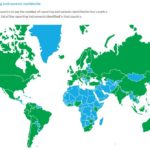The United Nations Environmental Program (UNEP), KPMG Sustainability, the University of Stellenbosch Business School (USB) and The Global Reporting Initiative (GRI) launched today Carrots and Sticks Promoting Transparency and Sustainability, a study on trends in voluntary and mandatory approaches to sustainability reporting. This research reveals that the regulatory landscape has substantially evolved in all parts of the world.
The study Carrots and Sticks Promoting Transparency and Sustainability investigates the latest developments in sustainability reporting and ESG (environmental, social and governance) disclosure in the regulatory field. It is the latest edition of a study initially published in 2006 to provide readers with an easy reference and overview of mandatory and voluntary approaches to sustainability reporting and assurance throughout the world. A co-production of UNEP, KPMG Sustainability, USB, and GRI, the study covers the majority of OECD countries (Organization for Economic Co-operation and Development) as well as emerging market countries such as Brazil, China, India and South Africa.
Angela Cropper, Deputy Executive Director of UNEP states As managers in public and private organisations face changing market conditions, information overload and growing public demand for accountable resources use, they need new management tools and credible information to take action. This implies a new era for public reporting, both at national and organisational level. It implies that conventional models of running financial reporting and so-called non-financial reporting as two separate islands are no longer acceptable.
"The evolution of regulated reporting shows that sustainability is increasingly seen as a key business issue that needs a level playing field" says Wim Bartels of KPMG Sustainability. "This should not only improve transparency but also companies’ focus on their sustainability performance. Whereas companies might prefer not to have additional regulation, it helps to raise awareness and drive professionalisation in this field globally, as part of a roadmap towards universal standards".
Adding to this discussion is Daniel Malan, head of the Unit for Corporate Governance at the University of Stellenbosch Business School in South Africa. This publication emphasises the fact that the debate about regulation and voluntary initiatives is not an either/or debate. Although our research suggests that the bar should be raised in terms of minimum reporting requirements, voluntary disclosure and innovation should be encouraged.
The financial crisis has sparked a renewed focus on regulation. The role of governments in sustainability reporting is an important part of this trend, as the state plays a stronger regulatory role in ensuring a minimum level of disclosure and risk prevention, assesses Teresa Fogelberg, Deputy Chief Executive at GRI. This means more rigorous sustainability reporting is going hand in hand with regulation.



